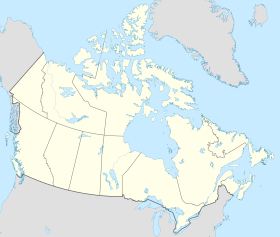Nunavut
territory of Canada
(Redirected from ᓄᓇᕗᑦ)
Nunavut is a territory in Canada. It is the newest, largest, and northernmost territory of Canada. It was founded in 1999 when many Inuit living in the Northwest Territories wanted to have an independent province and government. Its capital is named Iqaluit. It is in the north of Canada, and has a particularly cold climate for much of the year. It has many native people (mainly Inuit).
Nunavut
Inuktitut syllabics ᓄᓇᕗᑦ | |
|---|---|
| Motto(s): ᓄᓇᕗᑦ ᓴᙱᓂᕗᑦ (Nunavut Sannginivut) "Our land, our strength" "Notre terre, notre force" "ᓄᓇᕗᑦ, ᓴᙱᓂᕆᔭᕗᑦ | |
| Coordinates: 70°10′00″N 90°44′00″W / 70.16667°N 90.73333°W | |
| Country | Canada |
| Confederation | April 1, 1999 (13th) |
| Capital | Iqaluit |
| Largest city | Iqaluit |
| Government | |
| • Commissioner | Eva Aariak |
| • Premier | P.J. Akeeagok (consensus government) |
| Legislature | Legislative Assembly of Nunavut |
| Federal representation | Parliament of Canada |
| House seats | 1 of 338 (0.3%) |
| Senate seats | 1 of 105 (1%) |
| Area | |
| • Total | 2,038,722 km2 (787,155 sq mi) |
| • Land | 1,877,787 km2 (725,018 sq mi) |
| • Water | 160,935 km2 (62,137 sq mi) 7.9% |
| • Rank | Ranked 1st |
| 20.4% of Canada | |
| Population (2021) | |
| • Total | 36,858 [1] |
| • Estimate (Q4 2021) | 39,589 [3] |
| • Rank | Ranked 13th |
| • Density | 0.02/km2 (0.05/sq mi) |
| Demonym(s) | Nunavummiut Nunavummiuq (sing.)[4] |
| Official languages | Inuktut (Inuit languages: Inuinnaqtun, Inuktitut)[5] English, French |
| GDP | |
| • Rank | 12th |
| • Total (2017) | C$2.846 billion[6] |
| • Per capita | C$58,452 (6th) |
| HDI | |
| • HDI (2018) | 0.908[7] — Very high (5th) |
| Time zones | UTC-07:00 (Mountain Time) |
| • Summer (DST) | UTC-06:00 |
| UTC-06:00 (Central Time) | |
| • Summer (DST) | UTC-05:00 |
| Southampton Island (Coral Harbour) | UTC-05:00 (Eastern Time) |
| UTC-05:00 (Eastern Time) | |
| • Summer (DST) | UTC-04:00 |
| Postal abbr. | NU[8] |
| Postal code prefix | X0A, X0B, X0C[9] |
| ISO 3166 code | CA-NU |
| Flower | Purple Saxifrage[10] |
| Tree | n/a |
| Bird | Rock Ptarmigan[11] |
| Rankings include all provinces and territories | |
The main form of transportation is the snowmobile. For the first week of being a separate unit, it was the Province of Nunavut, but after a week it was renamed Nunavut Territory.
A symbol of the territory is the Eskimo Dog (qimmiq).[12] Even today, some people still use these dogs.[source?]
Gallery
changeReferences
changeWikimedia Commons has media related to ᓄᓇᕗᑦ.
- ↑ "Population and dwelling counts: Canada, provinces and territories". Statistics Canada. February 9, 2022. Retrieved February 9, 2022.
- ↑ "Population and Dwelling Count Highlight Tables, 2016 Census". Statistics Canada. February 8, 2017. Retrieved 2017-02-08.
- ↑ "Population by year of Canada of Canada and territories". Statistics Canada. September 26, 2014. Retrieved September 29, 2018.
- ↑ Nunavummiut, the plural demonym for residents of Nunavut, appears throughout the Government of Nunavut website Archived January 18, 2009, at the Wayback Machine, proceedings of the Nunavut legislature, and elsewhere. Nunavut Housing Corporation Archived 2022-10-14 at the Wayback Machine, Discussion Paper Released to Engage Nunavummiut on Development of Suicide Prevention Strategy. Alan Rayburn, previous head of the Canadian Permanent Committee of Geographical Names, opined that: "Nunavut is still too young to have acquired [a gentilé], although Nunavutan may be an obvious choice." In Naming Canada: stories about Canadian place names 2001. (2nd ed.). Toronto: University of Toronto Press. (ISBN 978-0-8020-8293-0); p. 50.
- ↑ "Consolidation of (S.Nu. 2008, c.10) (NIF) Official Languages Act" (PDF). and "Consolidation of Inuit Language Protection Act" (PDF). Government of Nunavut. Retrieved August 5, 2021.
- ↑ "Gross domestic product, expenditure-based, provincial and territorial, annual (x 1,000,000)". Statistics Canada. 2019-09-21.
- ↑ "Sub-national HDI - Subnational HDI - Global Data Lab". globaldatalab.org. Retrieved 2020-06-18.
- ↑ "Canada Postal Codes". postalcodes.azinfoportal.com. Retrieved 2024-04-06.[permanent dead link]
- ↑ "Nunavut Territory Postal Codes". postalcodes.azinfoportal.com. Retrieved 2024-04-06.[permanent dead link]
- ↑ "The Official Flower of Nunavut: Purple Saxifrage". Legislative Assembly of Nunavut. 2011. Archived from the original on September 23, 2015. Retrieved July 31, 2011.
- ↑ "The Official Bird of Nunavut: The Rock Ptarmigan". Legislative Assembly of Nunavut. 2011. Archived from the original on May 8, 2014. Retrieved July 31, 2011.


